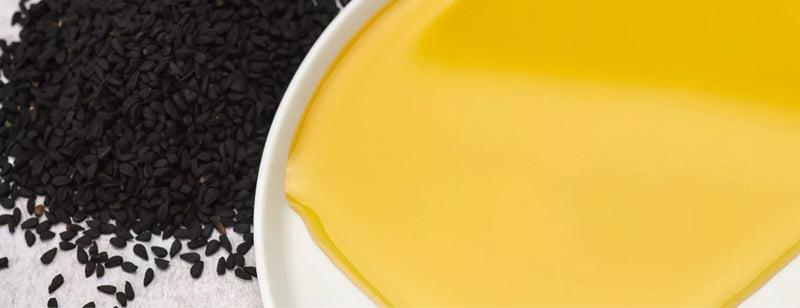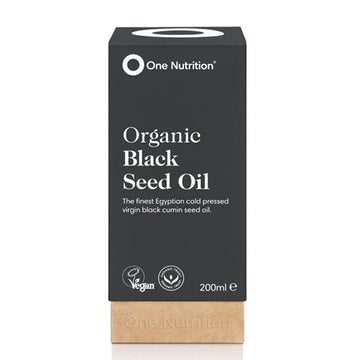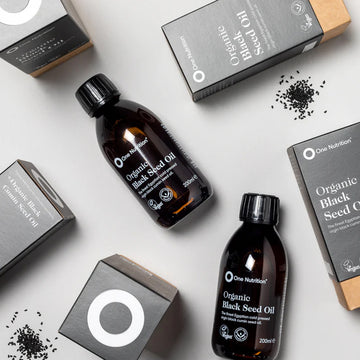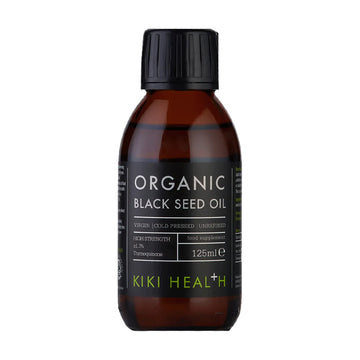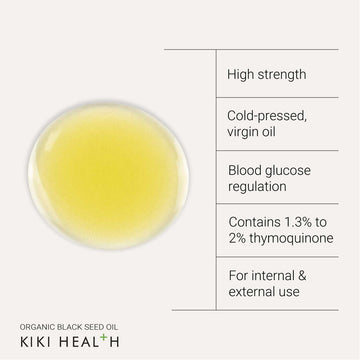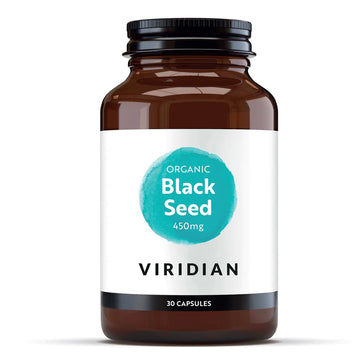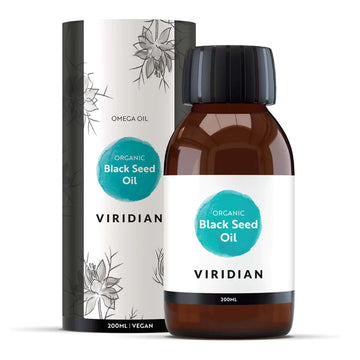An oil few of us here have heard of, Organic Black Seed oil has been popular in the Middle East and the Far East for thousands of years. It is traditionally used in food and as a general wellbeing oil and is derived from the black seeds of the Nigella Sativa plant, a small plant with pale purple, blue or white flowers that grows abundantly in Eastern Europe, Western Asia and in the Middle East.
The seeds are also known as black caraway, black cumin, kalonji and black onion seeds and culinary fans may have come across them being used to flavour curries, bread and pickles in a similar way to more well-known spices like cumin and coriander.
Organic Black Seed Oil has a pleasant aroma and taste and so can be used in salad dressings, for baking and is delicious when drizzled over side dishes like roasted vegetables.
Also known as The Blessed Seed, the oil is not just good to eat and in the Middle East people add it to massage oils, homemade skin-care products and fragrances because of the benefits in traditional use.
What are the benefits of organic black seed oil?
Black seed oil has been used in ancient medicine to treat a variety of ailments, such as arthritis, multiple infections, toothaches and headaches. The key ingredients in organic black seed oil include the omega-3, 6 and 9 family of fatty acids, as well as Vitamin A, Thymoquinone, Thymol and Nigellone – all of which work collectively to boost skin, hair and joint health as well.
This study found that by consuming just 5ml of organic black seed oil each day for about 8 weeks can help you lower blood pressure, as long as you’re generally healthy and don’t have any serious pre-existing health conditions.
An animal study demonstrated how the omega-3 fatty acids in black seed oil can reduce inflammation which is typically caused by a high-fat “western” diet. In fact, this review confirms black seed oil’s ability to offer strong anti-fungal and anti-pathogenic properties too.
In a controlled trial, black seed oil supplementation was shown to help improve symptoms of asthma, while this review suggests that consuming organic black seed oil can help manage diabetes.
Another review suggests that Nigella sativa can help those struggling to lose weight by reducing BMI and waist girth.
The above are just some of the benefits of orally consuming organic black seed oil. Current research indicates that it is perfectly safe to take it in relatively large doses for up to 3 months. However, overdosing on the supplement may lead to stomach upsets, constipation, vomiting and allergic skin reactions in some people.
How to identify good quality black seed oil
When looking for a high-quality black seed oil supplement, always look for the words “virgin”, “cold-pressed” and “certified organic” on the label. A high-quality and natural black seed oil supplement will always be cold-press extracted from small and oblong-shaped black seeds, which helps to keep its health benefits intact. It also means that no solvents have been used in the extraction process.
Virgin, cold-pressed black seed oil will, by definition, always be “organic” – meaning that it will maintain the original plant sterols, natural antioxidants, trace minerals and omega fatty acids. So, as long as your black seed oil is certified organic and virgin cold-pressed, you’re investing in the same therapeutic medicine people have been using for centuries to boost their health and wellbeing!
One Nutrition Organic Black Seed Oil is a high-quality black cumin seed oil made exclusively from organic Egyptian black seed, preserved in an amber glass bottle.
Is black seed oil beneficial for the skin and hair too?
It is, absolutely! Did you know black seed oil is being used in more than 2,000 countries to help with thinning hair and regrowth? The way it works is that it reduces inflammation in the scapular skin, reducing flakiness and sensitivity. Apply it directly and consistently to your scalp, and you will notice much better hair growth, density and overall health.
One of the most common causes of hair thinning and hair loss (other than genetic factors) is inflammation and wounds in the scalp. Black seed oil helps to soften the scapular skin and hydrates each hair follicle, giving you thicker and more consistent growth over time.
There’s research backing the fact that black seed oil reduced inflammation in the skin, which in turn, leads to healthier hair growth. Another study clearly shows how black seed oil mixed with other oils, such as coconut, henna and Indian gooseberry, reduced hair loss in men and women aged between 17 and 40.
This study demonstrates the positive effects of Nigella sativa (black seed oil) when applied directly to the skin, to improve hair growth and scapular health.
There are also many studies that vouch for black seed oil’s positive effects on general skin health, due to its antimicrobial and anti-inflammatory effects – people suffering from acne and other skin conditions can particularly benefit from it. Plus, it also helps to deal with dark spots, wrinkles, and fine lines, as well as softens up the skin and helps fight eczema.
This study shows how black seed oil’s anti-inflammatory and antimicrobial properties are beneficial for the skin – while this study reveals how black seed oil can help deal with symptoms of specific skin conditions like acne, psoriasis and eczema, acting as a skin softener, moisturizer and hydrator. Its anti-inflammatory properties encourage wound healing, with inflammation and wounds being one of the most common causes of certain skin conditions, including acne.
This detailed study revealed a number of benefits of topically applying black seed oil, such as helping to deal with skin pigmentation, acne, hypersensitivity reactions, acne psoriasis, wound healing and more – thanks to its anti-fungal, anti-parasitic, antiviral, antibacterial and anti-inflammatory properties.
Quick recap – Benefits for overall health and hair & skin
Use a quality black seed oil supplement and you can prevent greying, dandruff, dryness, itching and other scapular conditions, thanks to the hydrating, soothing and moisturizing properties. The abundant concentration of antioxidants and anti-inflammatory ingredients can restore damaged hair of practically every type.
People suffering from certain skin conditions can definitely benefit from black seed oil. Its therapeutic effects on the skin have been widely documented, such as a reduction in the symptoms of acne, eczema and psoriasis as well as other conditions like dark spots, fine lines and wrinkles.
Additionally, cold-pressed virgin black seed oil offers a variety of health and well-being benefits such as the management of blood pressure and diabetes as well keeping the kidneys and cardiovascular system healthy, to name a few.


